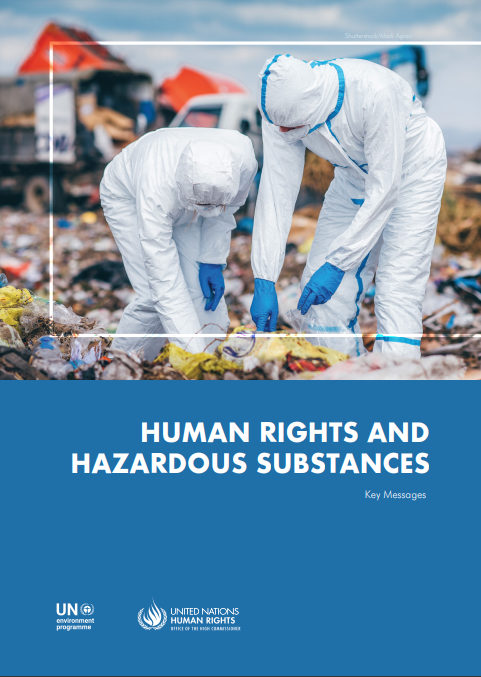The Office of the High Commissioner for Human Rights (UN Human Rights) delivers ten important messages on human rights and hazardous substances. The messages highlight the human rights obligations and responsibilities of States and other duty-bearers, such as businesses, to prevent and remedy the harmful effects of hazardous substances.

The following are the messages:
- Ensure a non-toxic environment for present and future generations. Every State must ensure comprehensive legal and policy measures, as well as effective, rights-based and transparent enforcement, monitoring, and accountability mechanisms, to prevent and minimize exposure to hazardous substances that can be a threat to the health, life and dignity of individuals and their environment as well as groups, and communities, including exposure caused or contributed to by businesses.
- Cooperate internationally to prevent and combat harms from exposure to hazardous substances. States refrain from permitting the export of hazardous substances for uses in other countries different from those they permit in their own.
- Prevent exposure to hazardous substances from business activities. A human rights-based approach that emphasizes the respective duties and responsibilities of States and businesses to prevent and minimize exposure to hazardous substances is needed to ensure sustainable development and the realization of human rights for all everywhere.
- Guarantee all persons’ access to information about hazardous substances. A human rights-based approach that emphasizes the respective duties and responsibilities of States and businesses to prevent and minimize exposure to hazardous substances is needed to ensure sustainable development and the realization of human rights for all everywhere.
- Ensure the meaningful and informed participation of all persons in decision-making processes. State actions and decisions related to the use of hazardous substances, therefore, must involve the informed participation of affected persons.
- Ensure accountability and effective remedies for human rights harms caused by hazardous substances. States must ensure accountability and access to justice and effective remedies, including judicial and other redress mechanisms, sanctions, administrative fines and action, and civil liability.
- Protect environmental human rights defenders. States need to ensure the protection of environmental human rights defenders through enacting and effectively implementing measures to combat impunity for attacks against defenders by all actors including businesses.
- Protect, respect, and fulfill the human rights of people who are in particularly vulnerable situations. Environmental justice within and among nations requires effective measures be taken to eliminate the disproportionate impact of hazardous substances on those with the fewest resources and the least responsibility for pollution.
- Guarantee all human beings the right to benefit from scientific progress and its applications. States should publicly share resources, scientific knowledge and technology in order to address the impacts hazardous substances have on the enjoyment of human rights and guarantee all persons the right to benefit from scientific progress and its applications
- Take a precautionary approach to the handling and management of hazardous substances and potentially hazardous substances. States and businesses should apply the precautionary principle throughout the lifecycle management of hazardous substances, e.g. in their production, licensing, use, trade, and disposal.
Copied from here.











